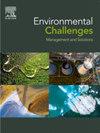美国灌溉的州级电力和排放足迹
Q2 Environmental Science
引用次数: 0
摘要
本研究量化了美国农业灌溉的州级电力足迹和相关的二氧化碳当量(CO₂e)排放足迹,这是能源-水-食物关系中必不可少但尚未得到充分研究的组成部分。根据公开数据,我们估计,到2023年,美国农田灌溉消耗约26.2太瓦时的电力,耗资25亿美元,产生820万吨二氧化碳当量。这些数字占全国用电量的0.68%,占全国二氧化碳排放量的0.57%,各州差异显著。这项分析首次使用了每隔几年才有一次的州一级结果的最新数据,强调了美国农业灌溉中有针对性的能源管理和减排战略的潜力。本文章由计算机程序翻译,如有差异,请以英文原文为准。
State-level electricity and emissions footprints of U.S. irrigation
This study quantifies the state-level electricity footprint and associated carbon dioxide-equivalent (CO₂e) emissions footprint of U.S. agricultural irrigation, an essential but under-examined component of the energy-water-food nexus. Using open data, we estimate that in 2023, on-farm irrigation in the United States consumed approximately 26.2 TWh of electricity, cost $2.5 billion, and produced 8.2 million metric tons of CO2e. These figures account for 0.68% of the national electricity consumption and 0.57% of national CO2e emissions, with notable state-level variations. This analysis, the first to use the most recent data for state-level results only available every few years, highlights the potential for targeted energy management and emissions reduction strategies in U.S. agricultural irrigation.
求助全文
通过发布文献求助,成功后即可免费获取论文全文。
去求助
来源期刊

Environmental Challenges
Environmental Science-Environmental Engineering
CiteScore
8.00
自引率
0.00%
发文量
249
审稿时长
8 weeks
 求助内容:
求助内容: 应助结果提醒方式:
应助结果提醒方式:


